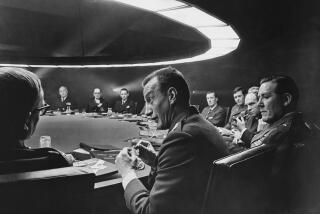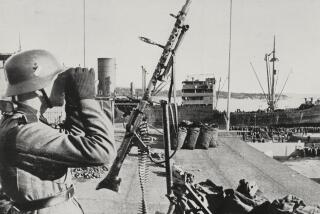War, fear and truth
Perhaps it would have surprised George Orwell, poet laureate of the Cold War, to find himself so much in our thoughts in this second decade of the post-Cold War age. The Soviet Union is 15 years dead, its imperium in the East long since ended. China has entered into a peculiar economic symbiosis with the American capitalist juggernaut. And yet, in this new post-ideological world, no writer is more vital than Orwell, not least because he helps us see how deeply that earlier struggle has marked us, helps us read the signs it has inscribed on the body of our politics.
Gazing at the solemn White House ceremony on Dec. 14, 2004, watching in inarticulate wonder as the newly reelected president placed the Medal of Freedom around the necks of three high officials, I began to perceive, dancing deep in my memory, a line of Orwell’s that I could not quite grasp.
Before me on the television screen, neck bent for the president, stood retired Gen. Tommy Franks, who had led the initial “combat phase” of the war in Iraq, that “combat phase” that had never ended. Beside him was L. Paul Bremer III, the bold and bumbling proconsul under whose regency the insurgency had taken root and flourished. And beside Bremer, finally, stood George Tenet, the director of Central Intelligence whose long tenure will be known to history as twice distinguished -- by the failure to detect the coming 9/11 attacks and by the certainty about Saddam Hussein’s bristling arsenal of weapons of mass destruction, those magical objects that, having provided the casus belli for the Iraq war, turned out not to exist.
The three men, dedicated public servants all, had been coauthors of failures quite monumental in their implications, a truth that by December 2004 was quite incontestable, whatever your politics. Now they were receiving from the leader’s hands the country’s highest civilian honor.
That their failures were incontestable did not matter. The ceremony served not to proclaim truth but rather to assert and embody a proposition that has been central to the current administration: Truth is subservient to power. Power, rightly applied, makes truth. As I watched the television screen, the fragment of Orwell that had been dancing just beyond the grasp of my consciousness finally took shape: “History is something to be created rather than learned.”
In a few moments, I found the full quotation:
“From the totalitarian point of view, history is something to be created rather than learned. A totalitarian state is in effect a theocracy, and its ruling caste, in order to keep its position, has to be thought of as infallible. But since, in practice, no one is infallible, it is frequently necessary to rearrange past events in order to show that this or that mistake was not made, or that this or that imaginary triumph actually happened.”
These words, written in 1946, are imbued with the anti-totalitarian struggle, the one just ended and the one about to begin. Six decades later, the United States is far from a totalitarian state. But we have seen, during these last half a dozen years of perpetual war, more than a little of “the totalitarian point of view” and more than a few attempts to “rearrange past events in order to show that this or that mistake was not made, or that this or that imaginary triumph actually happened.”
Indeed, after the missing weapons and the aircraft-carrier victory celebrations and the denials of torture, Orwell’s words might serve as a succinct and elegant description of much of our politics -- or, better yet, they might be taken as a caption and placed beneath a photograph of Messrs. Frank, Bremer and Tenet receiving their medals from a grateful sovereign.
George Orwell would not have been surprised by any of this. It was Orwell, after all, who nearly six decades ago created the perpetual world war between the super-states of Oceania, Eurasia and Eastasia that booms away in the background of “1984” -- a never-ending, shape-shifting struggle that, Orwell said, “helps to preserve the special mental atmosphere that a hierarchical society needs.” Orwell’s virtual war, unlike our war today, was nearly bloodless. The great grinding mechanism of modern industrial warfare had been stripped of all its material attributes: armies, fighting, even death -- all but “the special mental atmosphere” that wars produce. War, in his conception, had been reduced down to its most valuable political ore.
That glittering precious ore that remains is the politician’s lodestone, for glowing at its heart is that most lucrative of political emotions: fear. War produces fear. But so too does the rhetoric of war. This leads to the central lesson Orwell brings us about our own perpetual war: What terrorists ultimately produce is not death or mayhem but fear, and in an endless War on Terror, the rich political benefits of that most lucrative emotion will inevitably be shared -- between the terrorists themselves and the political leaders who lead the fight against them. Fear bolsters power, and power makes truth -- if, of course, we stand aside and let it.
Mark Danner, the author of “The Secret Way to War,” is a professor of journalism at UC Berkeley and at Bard College.
More to Read
A cure for the common opinion
Get thought-provoking perspectives with our weekly newsletter.
You may occasionally receive promotional content from the Los Angeles Times.






